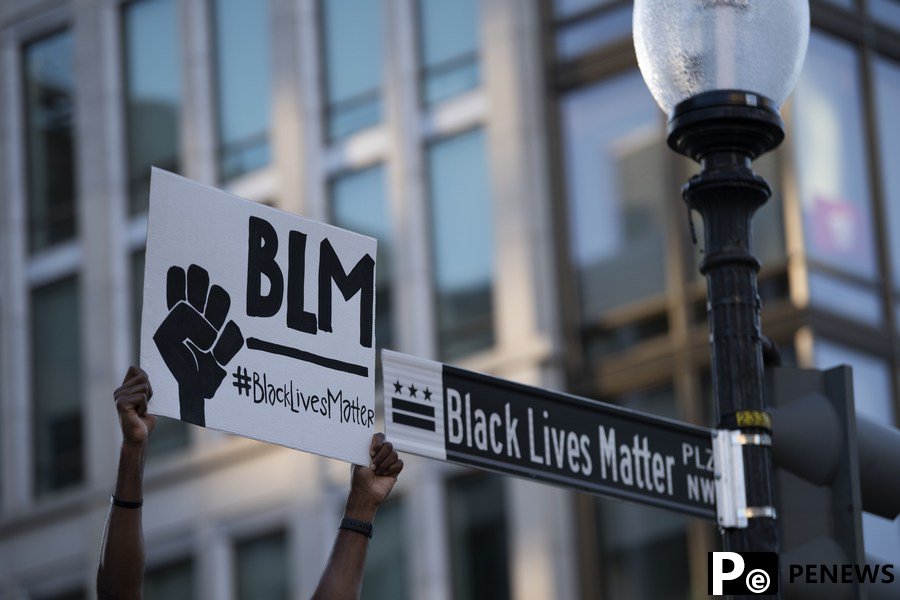Home>>
Ethnic minorities in the U.S. have long suffered from bullying, discriminationBy Hu Zexi (People's Daily Online) 14:49, May 07, 2021
In the U.S., racism has become a centuries-old disease with no cure or vaccine in sight. Even before the trial for the murder of George Floyd had come to an end, another nearby murder case in Minnesota in which a Black man was shot dead by a police officer once again stirred up the public’s anger. And yet, this was hardly a coincidence. In fact, viciously violent incidents targeting ethnic minorities have constantly rattled the conscience of the U.S. and its people.

A protester holds a sign near the White House in Washington D.C., the United States, on June 8, 2020. (Xinhua/Liu Jie)
The outrageous cases of racial discrimination in the country are just the tip of the proverbial iceberg, underneath of which lies widespread systemic injustice, a country-wide phenomena that has been exposed to a larger swathe of people following the sudden emergence of the COVID-19 pandemic and the consequences in its wake for racialized communities dotted across the map.
Data has indicated that African Americans, Hispanic Americans and other ethnic minorities in the U.S. have been hit hard by the pandemic to varying degrees. The hard times have revealed the stark disparities that exist and continue to persist with regard to the distribution of economic and social resources among different ethnic minorities living in the country.
"Look at our community: You see food deserts, transportation deserts, and education deserts," said Celia Maxwell, associate dean for research with the Howard University College of Medicine. "All the social determinants of health that you would look to [in order to] keep the community in good health are missing from our communities of color," she added.
During the period from 2010 to 2018, Blacks remained 1.5 times more likely to be uninsured than Whites, while the uninsured rate among Hispanics/Latinos remained over 2.5 times higher than that of Whites, as indicated in a report from the Kaiser Family Foundation. The country’s notoriously high medical expenses have forced people in minority communities to stop receiving or withhold medical treatment. What’s worse, visible minorities have also seen individuals subjected to unfair treatment and flagrant abuse even during the times when they were hospitalized and under the care of medical professionals
The New York Times reported that a large number of studies have published evidence indicating that due to racial discrimination, people of color in the U.S. are provided with less health care and medical attention compared with White Americans who remain in the majority. In addition to concerns over the equitable distribution of resources, the number of Black business owners in the U.S. was found to have dropped by 41 percent between February and April 2020, compared to an accompanying 17 percent drop in the number of White business owners, according to the Federal Reserve Bank of New York.
In the same vein, Politico pointed out that Black families have faced a "well-documented pattern of financial discrimination that has stymied their ability to accumulate wealth at the same rate as white families." For example, Black people are denied loans at much higher rates than White families with similar credit profiles and face higher interest rates when they do qualify.
Similar scenarios can be seen in all aspects of the American economy and society. Minors of color under the age of 18 comprise about one third of the total population in the same demographic group, yet they account for two thirds of the total number of minors incarcerated in the country. Meanwhile, Black Americans are three times more likely than their White counterparts to be killed by police officers. Statistics show that the median White household has accumulated 42 times more wealth than the median Black family and 23 times more than the median Hispanic and Latino family.
According to USA Today, only 44 percent of Black families owned their homes as of the first quarter of 2020, compared with 73.7 percent of White households. And when it comes to the criminal justice system, only 4 percent of the 13,000 FBI agents stationed around the world are Black, with the agency eliminating a disproportionately larger number of African-American applicants during its training process upon recruitment.
In fact, a large number of opinion polls have revealed that most Americans view race relations as a major issue in the country. But when it comes to political decision-making on high, many reforms related to addressing racial injustice have been aborted time and time again. For instance, the George Floyd Justice in Policing Act, which is named after the man whose death while in police custody sparked country-wide protests against racial inequity, has been stalled on the Senate floor amid Republican opposition.






